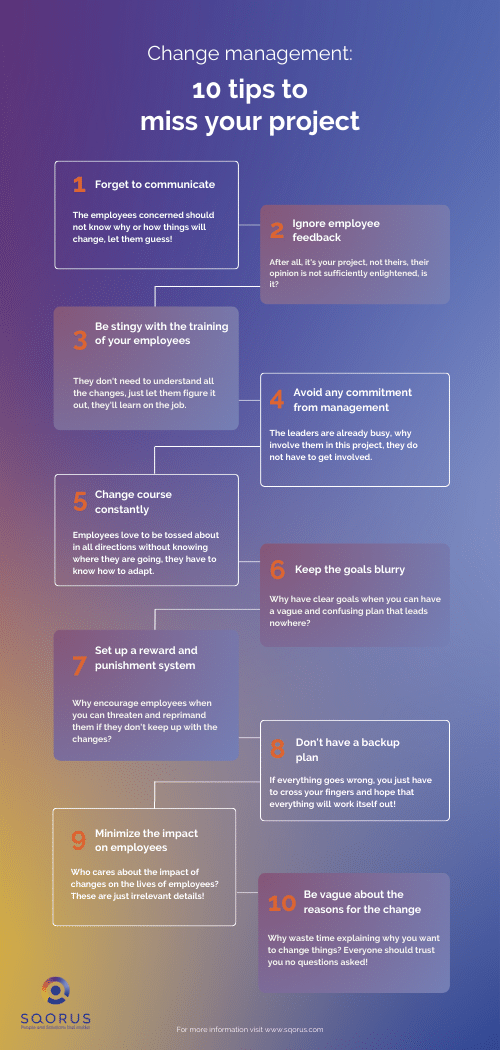Change management: 10 tips to miss your project
In an ever-changing world, change management is essential to the success of transformation projects. Yet it’s surprising how often companies fall into the trap of poor change management practices.
In this article, we’ll reveal these ineffective practices and show you how to effectively sabotage a change project. But make no mistake, our aim is to give you the keys to avoiding these costly mistakes and guiding you towards successful change management.
#1 Forget about communicating change
The employees concerned shouldn’t know why or how things are going to change – just keep them guessing!
Change is often a source of anxiety for those concerned. Communicating the objectives of the change clarifies expectations and reassures people about the direction to be taken.
Regularly informing employees about the stakes, benefits and progress of the change project is essential to getting them interested in the changes ahead and gaining their approval.
#2 Ignore feedback from employees affected by a change project
After all, it’s your project, not theirs, so their opinion isn’t sufficiently informed, is it?
Are you ignoring feedback from your employees affected by a change project? You could be missing out on a wealth of information that is vital to the success of your project.
Feedback from employees helps to identify what’s not working and where there are opportunities to improve the support system. This allows you to adjust and improve the different actions to better meet the needs of the stakeholders, in this way you guarantee a part of the adhesion.
In a world that is constantly evolving with digital transformation and organizational changes, listening carefully to the feedback of those directly affected can make all the difference.
#3 Be stingy about training your employees during your change management process
They don’t need to understand all the changes, let them figure it out on their own, they will learn as they go.
This approach can seriously compromise the success of your change project. While you may be tempted to think that your employees can handle themselves, neglecting training can lead to gaps and increased resistance to change.
In fact, training allows employees to be more confident and competent in their work after the change is implemented. Training helps to reduce resistance to change by providing all the knowledge and skills needed to succeed in their new role.
#4 Avoid any commitment on the part of management to your change project
The managers are already busy, so why involve them in this project, they have no business getting involved.
Although managers may already seem overwhelmed by their responsibilities, actively involving them in the change process is essential to ensure its success.
Because of its leadership position in the organization, management can influence culture by modifying its own behavior to adopt more relevant or effective practices. By setting an example, they can also establish new organizational norms and values to support change and motivate teams to embrace new change practices.
Don’t forget that to bring about lasting change, it’s essential to involve key players, adopt a comprehensive change management approach and facilitate transformations within the organization.
#5 Change course constantly during change management
Employees love to be tossed about without knowing where they’re going, so you have to know how to adapt.
Constantly changing course may seem dynamic, but it can also sow confusion and uncertainty among employees. Maintaining a clear direction to follow keeps the focus on project objectives and avoids unnecessary deviations. By staying on course, team members can better understand their roles and tasks, and are more likely to work together effectively to achieve set objectives.
What’s more, it allows us to measure the progress of the transformation project and ensure that we’re staying on track to achieve the expected results.
Remember that organizational change requires commitment, coaching and a thoughtful approach. By not constantly changing course, you promote stability, consistency and efficiency in your organization’s work environment.
At SQORUS, we’re here to help you make your change project a success . Contact our experts today!
#6 Keep objectives vague for an effective change project
Why have clear objectives when you can have a vague, confused project that leads nowhere?
Keeping goals vague may seem more flexible and less restrictive, but it can also lead to confusion, disengagement and a loss of direction. On the other hand, proposing clear objectives ensures that all those involved in a change (employees, managers, management, etc.) understand what is expected of them. This is an essential step to align everyone and avoid misunderstandings.
Don’t underestimate the importance of setting precise objectives and communicating them transparently. This facilitates adaptation in the face of change, and fosters a proactive, committed approach to change. Reducing uncertainty means reducing stress in the face of change.
#7 Set up a system of rewards and punishments for successful change management
Why encourage employees when you can threaten and reprimand them if they don’t follow the changes?
Implementing a system of rewards and punishments may seem an effective approach to motivating staff to follow through on changes. However, this can have a detrimental effect on the success of change management.
The merit system can give rise to defensive and sabotaging behaviors that slow down the adaptation process. What’s more, rewards can sometimes be perceived as superficial incentives that don’t necessarily reflect genuine motivation or commitment to change. Finally, it may create inappropriate competition and not encourage productive collaboration.
Rather than focusing on rewards or punishments, it’s better to put in place measures that facilitate change, accompany transformation and promote successful change.
By focusing on a positive, participative approach, you’ll make change easier to embrace, and you’ll be able to encourage teams to invest fully in change, collaborate constructively and foster successful evolution within your organization.
#8 Don’t have a back-up plan to make your change project a success
If everything goes wrong, just cross your fingers and hope it all works itself out!
Not having a backup plan for your change project can be a risky approach. In the event of difficulties or unforeseen events, it is essential to have a resilience strategy in place to ensure the success of the transformation project.
Each change project has its share of hazards, unforeseen events, each company is increasingly faced with many changes that could jeopardize the realization of the project.
Working in an agile and flexible way, regularly adapting the operational elements of the system without changing the ambition of the project, allows you to ensure the resilience of the project in an efficient way. At the same time, this will boost the confidence of project stakeholders in your ability to manage risk throughout the project.
#9 Minimize the impact of change on employees
Who cares about the impact of change on employees’ lives? These are just unimportant details!
Not considering the impacts of change on employees, such as their comfort, their routine, their habits, is tantamount to not considering their work, which inevitably leads to damaging their motivation, their commitment and their job satisfaction.
Change brings with it different levels of anxiety and frustration that need to be taken into account in a change management plan adapted to your context and culture to ensure continuity of work and success of the project.
Dealingwith change and supporting change requires an empathetic, needs-oriented approach.
#10 Be vague about the reasons for the change
Why waste time explaining why you want to change things? Everyone should trust you, no questions asked!
Being vague about the reasons for change is an approach that limits employee understanding and support. On the contrary, it’s essential to take the time to clearly explain the reasons behind the change.
Be sure that people are more likely to accept and support change when they understand the context and reasons behind it.
Giving meaning to change helps employees to reduce uncertainty and confusion, and to become actively involved in its implementation. Providing a frame of reference helps to create an organizational culture that values change and innovation, a genuine culture of change that encourages people to be more open to future changes, and to see them as opportunities rather than threats.
Conclusion on bad practices to sabotage your change project
If these examples have made you smile, it’s because you’re already aware of the importance of successful change management to ensure a smooth transition to new ways of doing things.
Clearly, change management requires a well-thought-out, strategic approach to maximize the chances of success. Whether we’re talking about change projects, organizational changes or transformations, it’simportant to have transparent communication, active stakeholder involvement and adaptation to the needs and realities of the organization.
At SQORUS, we’re here to help you bring your change project to a successful conclusion, thanks to our personalized support offer and our specially developed method: EXAD – EXplorer and ADopter.
Don’t forget that change management is a key stage in any successful transformation project. With our change management services, we can help you avoid these bad practices and make a success of your project by involving your employees and ensuring their buy-in to the change. Do not hesitate to contact us to discuss this with our experts.
Infographic on how to fail your change management project

DOWNLOAD THE WHITE PAPER
"WHICH TOOLS TO PILOT YOUR HR STRATEGY?"
Also read in our "HR strategy management tools" file:
- Digitization of HR services: the key to overcoming the crisis
- How to conduct a managerial innovation process?
- CSR as a leverage for performance and innovation
- 7 HR trends for 2023
- From "customer centric" to "employee centric
- Employee experience: why are HR and employees not aligned?
- What are the major issues facing HRDs today?
- Organization, talent management, recruitment: priority HR projects?
- Human resources management: what HR strategies for the future?
- Best practices to manage your HR strategy in an optimal way
- The different HR management tools to carry out your HR strategy
- HRIS software: the different areas of intervention for the HR function
- How to convince your management to invest in an HRIS tool?
- Is it necessary to be accompanied in the management of an HR strategy?
- What indicators should be defined to measure the performance of an HR strategy?
- HR strategy: how to achieve effective HR reporting?
- Who should drive HR projects in the company?
- Setting up a working group for an HR project: who should be involved?

